A Dynamics 365 Consultant plays a key role in helping businesses harness the power of Microsoft Dynamics 365, aligning technology capabilities with business strategies. They are responsible for customizing and implementing solutions that drive operational success and enhance productivity across various sectors.
Skills for a Dynamics 365 Consultant encompass both technical proficiency in the Dynamics 365 platform and broader capabilities such as business analysis, project management, and customer relationship management. Effective communication and problem-solving skills are also integral to fostering productive collaborations.
Candidates can write these abilities in their resumes, but you can’t verify them without on-the-job Dynamics 365 Consultant skill tests.
In this post, we will explore 7 essential Dynamics 365 Consultant skills, 7 secondary skills and how to assess them so you can make informed hiring decisions.
Table of contents
7 fundamental Dynamics 365 Consultant skills and traits
The best skills for Dynamics 365 Consultants include Dynamics 365 Expertise, Business Process Knowledge, Technical Customization, Data Management, Integration Capabilities, Problem Solving Skills and Project Management.
Let’s dive into the details by examining the 7 essential skills of a Dynamics 365 Consultant.
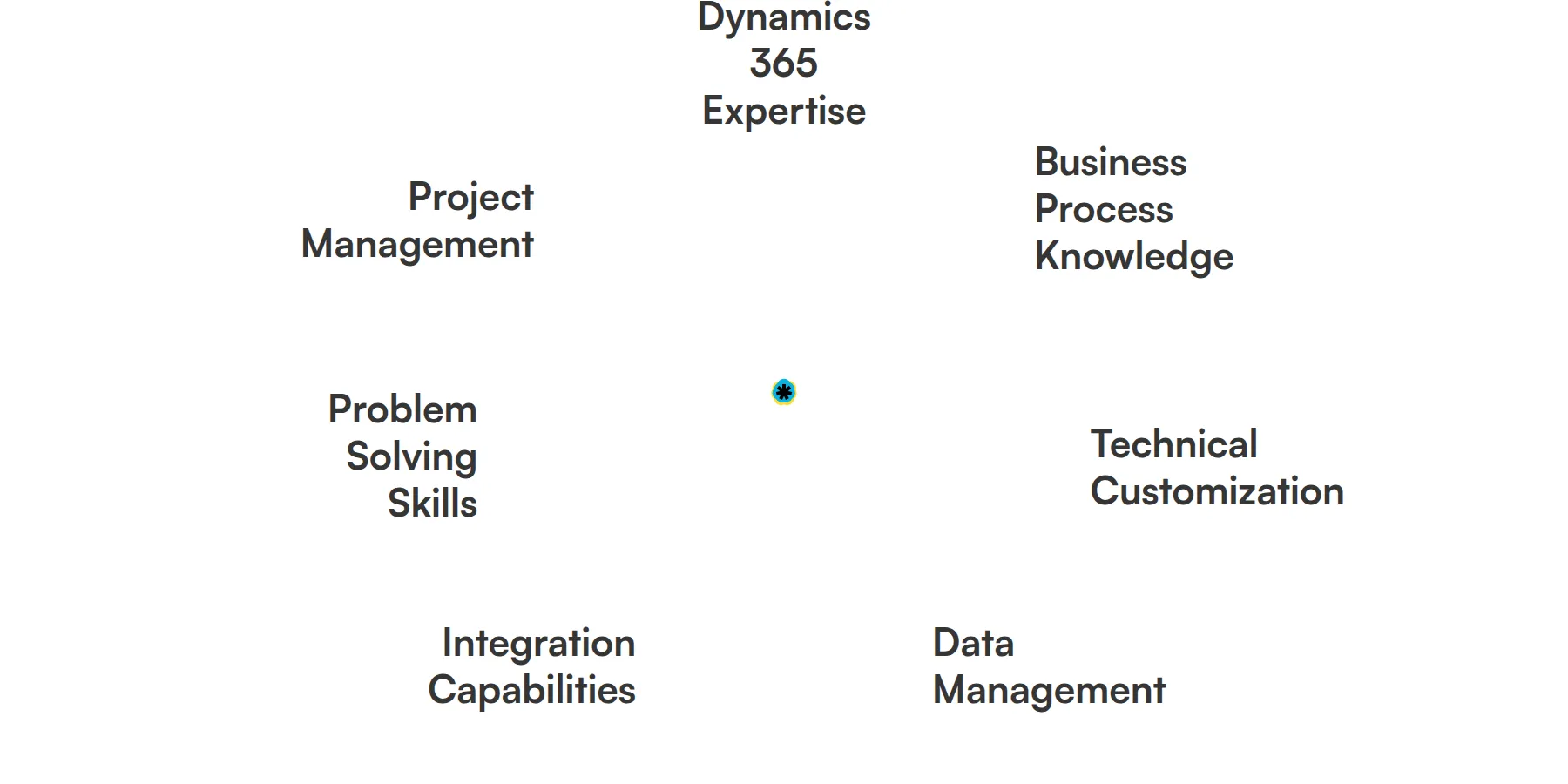
Dynamics 365 Expertise
A Dynamics 365 Consultant must possess a deep understanding of the Dynamics 365 platform, including its various modules like CRM and ERP. This expertise enables them to tailor solutions to business needs effectively, leveraging the platform’s features and functionalities.
Check out our guide for a comprehensive list of interview questions.
Business Process Knowledge
Understanding business processes is key for a Dynamics 365 Consultant. They need to analyze and design process flows within the system to support business operations. This involves aligning system capabilities with organizational goals.
Technical Customization
Proficiency in customization of Dynamics 365 allows consultants to modify the platform according to specific requirements. This involves using tools like Power Apps and Power Automate to automate tasks and create custom workflows.
Data Management
Handling large volumes of data is a critical skill. Consultants need to ensure data integrity and security within Dynamics 365, organizing and managing data efficiently for insights and decision-making.
For more insights, check out our guide to writing a Data Manager Job Description.
Integration Capabilities
A Dynamics 365 Consultant often needs to integrate the system with other applications. This skill involves using APIs and integration tools like Azure Logic Apps to ensure seamless interaction between systems.
Problem Solving Skills
Problem-solving is at the core of a consultant's role. They need to diagnose issues within the Dynamics 365 platform and devise solutions that align with business objectives, enhancing system performance.
Check out our guide for a comprehensive list of interview questions.
Project Management
Managing implementation projects effectively is crucial. Consultants must coordinate tasks, set timelines, and ensure project goals are met, facilitating smooth deployment of Dynamics 365 solutions.
7 secondary Dynamics 365 Consultant skills and traits
The best skills for Dynamics 365 Consultants include Change Management, Reporting and Analytics, User Support, Azure Cloud Knowledge, SQL Knowledge, Communication Skills and Configuration Management.
Let’s dive into the details by examining the 7 secondary skills of a Dynamics 365 Consultant.
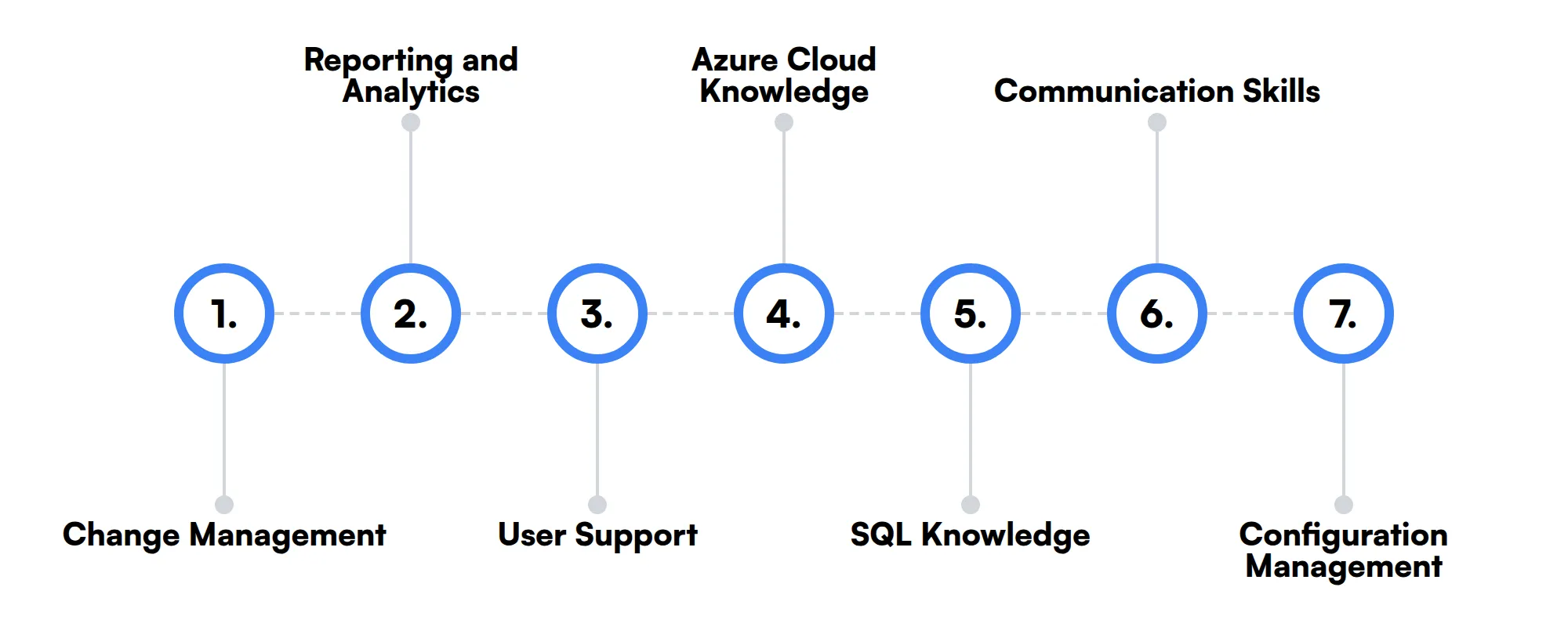
Change Management
Helping organizations adapt to new systems involves change management skills. Consultants should assist users in transitioning to Dynamics 365 by offering training and resources.
Reporting and Analytics
Crafting detailed reports and analytics is a valuable skill for monitoring performance. Using Dynamics 365’s reporting tools helps in evaluating system efficiency and business outcomes.
User Support
Providing technical support to users is important for resolving day-to-day issues. A good consultant guides team members in utilizing Dynamics 365 effectively, enhancing user experience.
Azure Cloud Knowledge
A working knowledge of Azure cloud services complements the Dynamics 365 skillset. Understanding Azure can enhance system capabilities with cloud-based solutions and infrastructure.
SQL Knowledge
Competency in SQL is useful for data querying and reporting. Dynamics 365 Consultants use SQL to access and manipulate data within the platform’s database for customized solutions.
Communication Skills
Clear communication is essential when working across departments. Consultants must effectively convey technical information and project updates to stakeholders and team members.
Configuration Management
Managing and maintaining configuration settings is part of system upkeep. This ensures the Dynamics 365 environment remains optimized and in line with business processes.
How to assess Dynamics 365 Consultant skills and traits
Evaluating the competencies of a Dynamics 365 Consultant involves examining a blend of both technical and soft skills. While resumes can showcase past achievements and certifications, they often fall short in demonstrating a consultant’s true ability to handle real-world challenges. Employing skills-based assessments can provide a clearer picture of a candidate's potential and fit for the role.
Understanding the Dynamics 365 platform is just a part of the equation. Hiring managers need to assess a candidate's business process knowledge, their technical ability to customize and manage data, as well as identify their problem-solving skills and project management capabilities. By focusing on these areas, they can ensure that the consultant not only understands the technical framework but can also integrate and innovate within it.
To streamline this complex evaluation process, Adaface on-the-job skill tests offer a practical approach that can improve the quality of hires by 2x and significantly reduce screening time by 85%. These assessments can be tailored to test specific Dynamics 365 skill requirements, helping you uncover the most qualified candidates efficiently.
Let’s look at how to assess Dynamics 365 Consultant skills with these 6 talent assessments.
Microsoft Dynamics 365 Finance Functional Consultant Test
The Microsoft Dynamics 365 Finance Functional Consultant Test evaluates a candidate's expertise in financial management within the Dynamics 365 environment. It covers areas such as general ledger, accounts receivable, and financial reporting through scenario-based multiple-choice questions tailored to Dynamics 365 functionalities.
The test assesses knowledge of financial management, including key areas such as budgeting, taxation, project accounting, and cost accounting. Candidates are evaluated on their ability to manage accounts payable and receivable, as well as navigate fixed assets and cash management.
Candidates who score well demonstrate a deep understanding of Dynamics 365 financial operations, including advanced skills in financial reporting and expense management. They show prowess in using Dynamics 365 to support and optimize financial processes.

Business Analyst Test
The Business Analyst Test uses scenario-based questions to evaluate candidates on their ability to identify and define business problems, gather requirements, and analyze data using critical thinking and problem-solving skills. The test also measures effectiveness in stakeholder communication.
Areas covered include requirements gathering, data interpretation, and creating process models. Candidates answer questions related to data visualization and SQL fundamentals, testing their ability to communicate insights and manage projects.
Candidates who excel demonstrate strong skills in defining business needs and developing effective solutions. They show competency in project management and agile methodologies, understanding how to leverage data to drive business decisions.

Microsoft Dynamics 365 Finance and Operations Apps Developer Test
The Microsoft Dynamics 365 Finance and Operations Apps Developer Test assesses a candidate's skills in developing and customizing Dynamics 365 apps. The test focuses on setup, configuration, and performance tuning using scenario-based questions and coding tasks.
It evaluates expertise in development and customization, data management, and workflow automation. The test also includes questions on security and user management, challenging candidates to demonstrate their ability to manage and optimize solutions.
Successful candidates bring experience in solution architecture and design and exhibit readiness in managing environments and resources using Lifecycle Services (LCS). They are skilled in performing comprehensive testing and debugging.
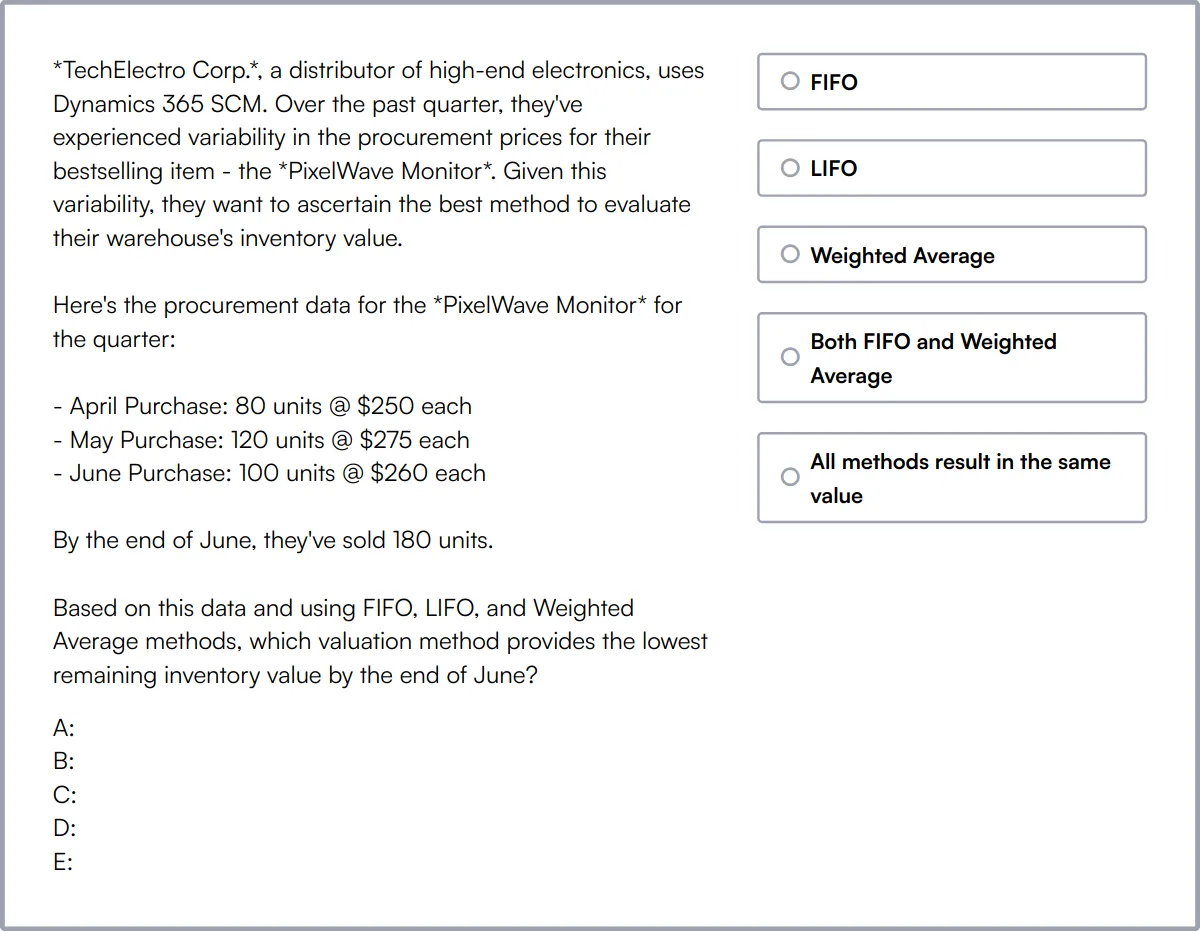
Data Modeling Skills Test
The Data Modeling Skills Test evaluates candidates' knowledge in database design, data integrity, and the transformation process within databases. This assessment gauges skills through questions on ER diagrams, normalization, and SQL.
Candidates navigate key topics like relational schema, data mapping, and data transformation. The test further challenges their understanding of data validation and the ability to use SQL in data manipulation tasks.
High-scoring candidates are proficient in database design principles and exhibit strong skills in data warehousing and normalization. They consistently demonstrate accuracy in maintaining data integrity and constructing robust database solutions.
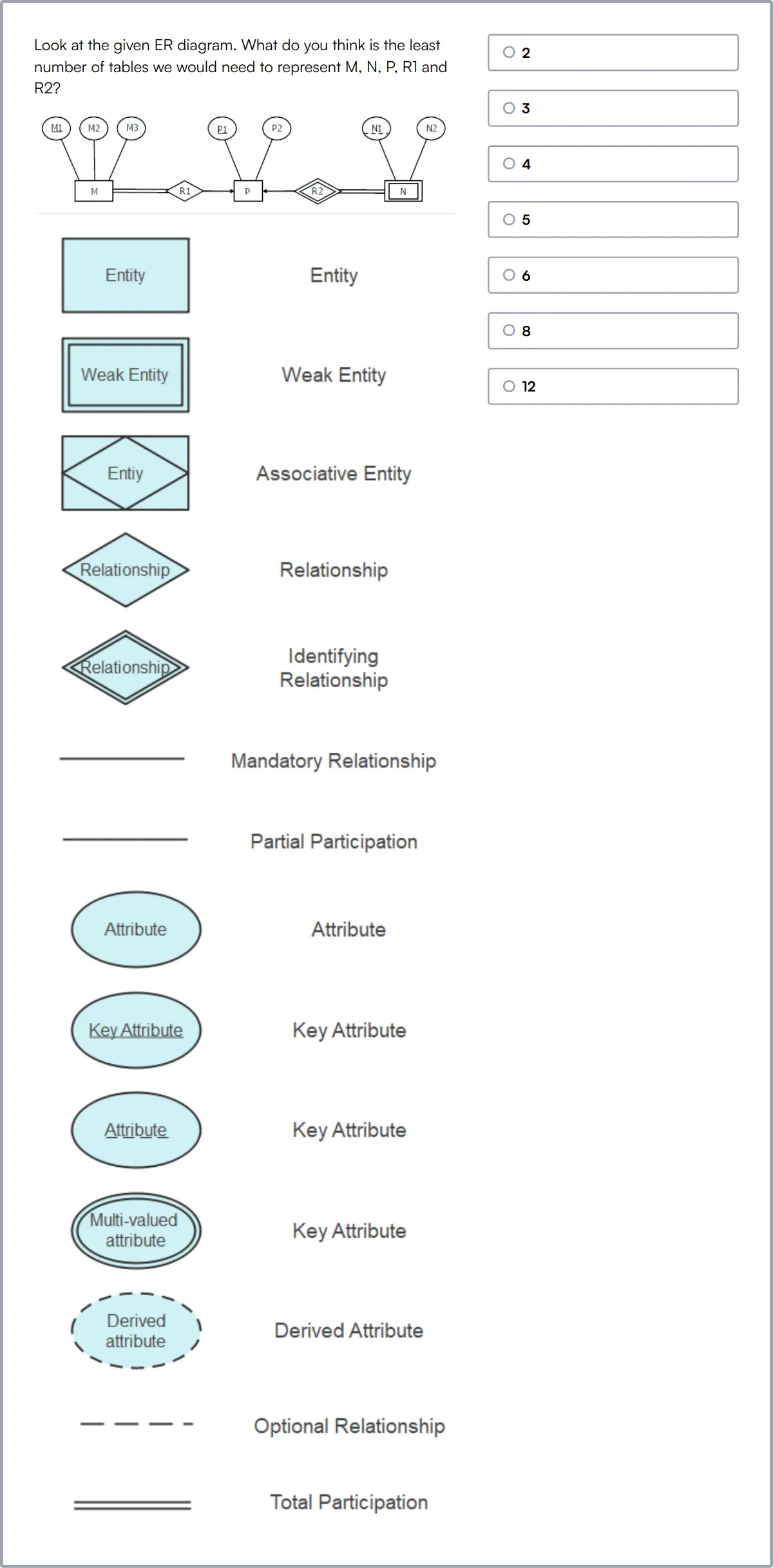
Elasticsearch Test
The Elasticsearch Test measures a candidate's ability to design and deploy Elasticsearch clusters, optimize search queries, and manage data indexing. The test uses scenario-based MCQs to evaluate their capacity to integrate Elasticsearch with other systems.
Topics include data indexing, search queries, and cluster management. The test also addresses performance optimization, scaling, and security, assessing the candidate's holistic understanding of Elasticsearch environments.
Candidates who perform well have notable skills in monitoring and troubleshooting Elasticsearch performance. They exhibit adeptness in the configuration and deployment of clusters, ensuring optimized and secure data retrieval processes.
Problem Solving Test
The Problem Solving Test evaluates candidates on their ability to analyze data and tackle complex problems. The test measures skills such as abstract reasoning, pattern recognition, and critical thinking through a variety of logical and reasoning scenarios.
Included challenges encompass deductive reasoning, inductive reasoning, and spatial reasoning. Candidates are expected to demonstrate their ability to interpret data and adapt their problem-solving strategies.
Successful applicants showcase strong deductive reasoning and agility in learning and applying concepts. They exhibit proficiency in breaking down complex instructions and developing and iterating solutions efficiently.
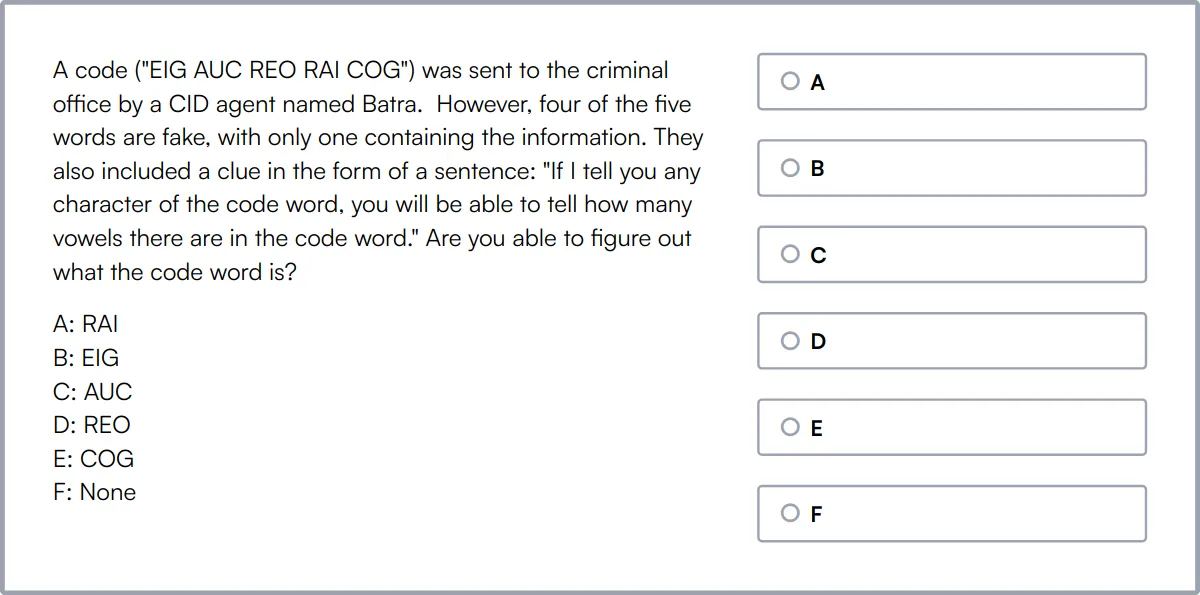
Summary: The 7 key Dynamics 365 Consultant skills and how to test for them
| Dynamics 365 Consultant skill | How to assess them |
|---|---|
| 1. Dynamics 365 Expertise | Test ability to navigate and configure Dynamics 365 modules. |
| 2. Business Process Knowledge | Assess understanding of business workflows and process mapping. |
| 3. Technical Customization | Evaluate skills in customizing Dynamics 365 solutions per client needs. |
| 4. Data Management | Check proficiency in managing and securing Dynamics 365 data. |
| 5. Integration Capabilities | Judge expertise in integrating Dynamics 365 with other systems. |
| 6. Problem Solving Skills | Observe approach to diagnosing and resolving Dynamics-related issues. |
| 7. Project Management | Assess ability to plan, execute, and deliver Dynamics 365 projects. |
Microsoft Dynamics 365 Commerce Functional Consultant Test
Dynamics 365 Consultant skills FAQs
What technical skills should a Dynamics 365 Consultant have?
A Dynamics 365 Consultant should have expertise in Dynamics 365, technical customization, Azure Cloud, SQL, and integration capabilities. These skills enable them to tailor solutions to specific business needs.
How can recruiters assess a candidate's Dynamics 365 expertise?
Recruiters can assess this by reviewing certification credentials, conducting technical interviews, and checking their experience with relevant case studies or projects.
Why is business process knowledge important for Dynamics 365 Consultants?
Understanding business processes helps consultants align the software with business needs, optimizing workflows and ensuring proper implementation of solutions.
How do change management skills benefit a Dynamics 365 Consultant?
Change management skills help consultants guide organizations through transitions smoothly, ensuring stakeholders are prepared and potential resistance is mitigated.
What role does data management play in the Dynamics 365 Consultant role?
Data management ensures the integrity, security, and accessibility of data, which is key for reporting, decision-making, and maintaining efficient operations.
How important are communication skills for a Dynamics 365 Consultant?
Communication skills are crucial for understanding client requirements, explaining complex solutions, and ensuring all stakeholders are aligned throughout the project.
How does project management expertise complement a Dynamics 365 Consultant's role?
Project management skills help consultants plan, execute, and manage projects effectively, ensuring that timelines, budgets, and goals are met.
What's the significance of user support in a Dynamics 365 Consultant role?
Providing user support helps in resolving user issues quickly, fostering user adoption, and ensuring that implemented solutions deliver the intended benefits.

40 min skill tests.
No trick questions.
Accurate shortlisting.
We make it easy for you to find the best candidates in your pipeline with a 40 min skills test.
Try for freeRelated posts
Free resources



